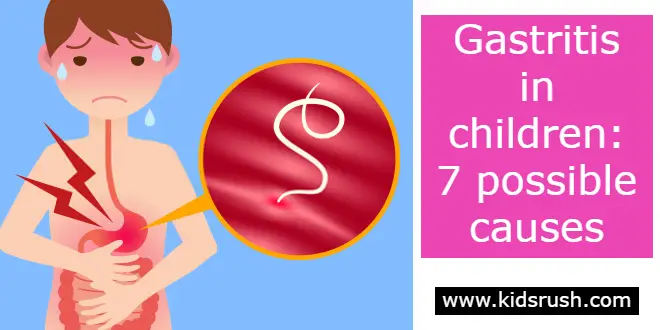The inflammation of the mucosa in the gastric tract can cause severe and sudden pain. Although we tend to think about gastritis as an adult’s disease, it is also a common problem in children in today’s society.
There are many potential causes of inflammation, from a poor diet to taking medications to the strain the child undergoes.
Gastritis in children: 7 possible causes

Emotional tension or stress
It is not only possible for adults to experience stress, but for children as well. Children can also suffer from the emotional tension that many adults undergo, whether from school responsibilities or family situations. These factors can result in excessive gastric acid secretion and gastritis.
Related: Helping Children With Attention Deficit
Poor diet
Consuming excessively sweet and fatty foods, artificial colors or spices, and eating too much hot food can also lead to the development of gastritis in children.
Related: How To Help A Baby Who Refuses To Eat?
Infections
An infection such as the flu or other infectious diseases can cause gastritis, as can the consumption of contaminated food if a child becomes infected.
Medication
Children can also be affected by gastritis if they take certain medicines.
Poor Hygiene
The bacteria are transmitted through cutlery or food that does not meet hygiene standards.
Starving
Children suffering from an immature stomach can also suffer from increased gastric acid secretion, which can cause inflammation.
Poor Chewing
Not chewing your food well while eating.
Gastritis symptoms in children
A pediatrician should be consulted to exclude gastritis in the event of these symptoms:
- When a child is under the age of 10, he or she will complain of abdominal pain around the navel. As the child gets older, the pain intensity increases a little more.
- Feeling of reflux or bad breath after eating.
- The child is unwilling to eat food because it causes tummy pain in the morning.
- Dark stools
- Nausea or vomiting.
- Shows an impressive weight loss.
Gastritis in children: treatment

Doctors recommend the following treatment for gastritis, depending on the cause:
- The medicine reduces excessive acid production in the stomach and protects the stomach lining.
- If bacteria caused gastritis, antibiotics may be prescribed.
- Experts recommend a diet and change the food habits of children suffering from gastritis, despite the fact they are often advised to avoid long periods without food, massive meals, spices, and teaching the chewing process at a slow pace to reduce acid production in the stomach.
- Yogurt, oatmeal, and carrot juice are also beneficial for the stomach. Honey, olive oil, and ginger are also helpful.
- Teaching the child to relax and ensuring they do not suffer emotional or stress-related situations that cause their body to produce excessive amounts of gastric acid that inflame the stomach is paramount to preventing gastric or stomach ulcers.
A doctor advises patients to stay away from anti-inflammatories that cause gastritis if they want to prevent the condition.
Effects of poorly cured gastritis on children
Children can suffer from mild to severe gastritis, which is treatable and not fatal. However, if not treated, many children suffer from ulcers soon, and if multiple abdominal abrasions happen, they could develop cancer.
Which situations require a pediatrician’s attention?
You should visit a pediatrician if:
- There are signs of suffering in the child and he cries uncontrollably.
- He flexes his muscle when he walks.
- There is no reason for him to stand up and he is lying down.
- The cramps haven’t stopped for more than 12 hours, but there’s been no diarrhea.
